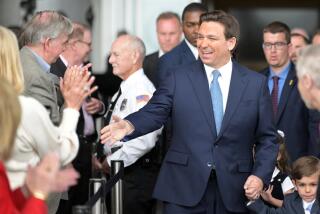Tricky Concept of a Just War : Quayle’s pep talk doesn’t quite catch all the nuances
- Share via
That was no professor of theology or ethics holding forth on the doctrine of the “just war” at the Crystal Cathedral in Garden Grove on Thursday; that was the vice president of the United States, Dan Quayle.
For centuries, the argument about whether military conflict is “just” has engaged Christian theologians trying to reconcile the Sermon on the Mount with the use of force. In a short pep talk to about 2,200 parishioners, Quayle marshaled a long and complex tradition to the following conclusion: “In order for a war to be just . . . there must be an advancement of good and avoidance of evil. Judging by these criteria, Operation Desert Storm truly is a just war.”
Suffice it to say, this may not have been the definitive statement on the application of the “just war” theory in the 1990s. Many Christian leaders, even those who believe that military force may at times be justifiable, have expressed concern about its use in the Persian Gulf and, in particular, the threat it poses to innocent civilians.
The task of justifying war on theological grounds today is complicated by the existence of ever-more-destructive weapons and by the fact that each side in a conflict may appeal to a higher justice, perhaps on religious grounds.
By the time that Quayle’s generation of college students wrestled with Vietnam, Christian thinkers already were debating whether there could be a “just war” in the nuclear age. In “We Hold These Truths,” an eloquent 1960 book on modern democracy, Catholic theologian John Courtney Murray addressed the problem and worried that Americans had little moral guidance for the wise application of their new-found global power.
That debate has intensified today, and the Gulf War has elicited complex moral responses from leaders of different cultures and religions.
Ultimately, theological considerations of which conflict is just and which isn’t may best be left to religious leaders and to individual consciences--and best left out of the speaking schedules of politicians.
More to Read
Get the L.A. Times Politics newsletter
Deeply reported insights into legislation, politics and policy from Sacramento, Washington and beyond. In your inbox twice per week.
You may occasionally receive promotional content from the Los Angeles Times.








